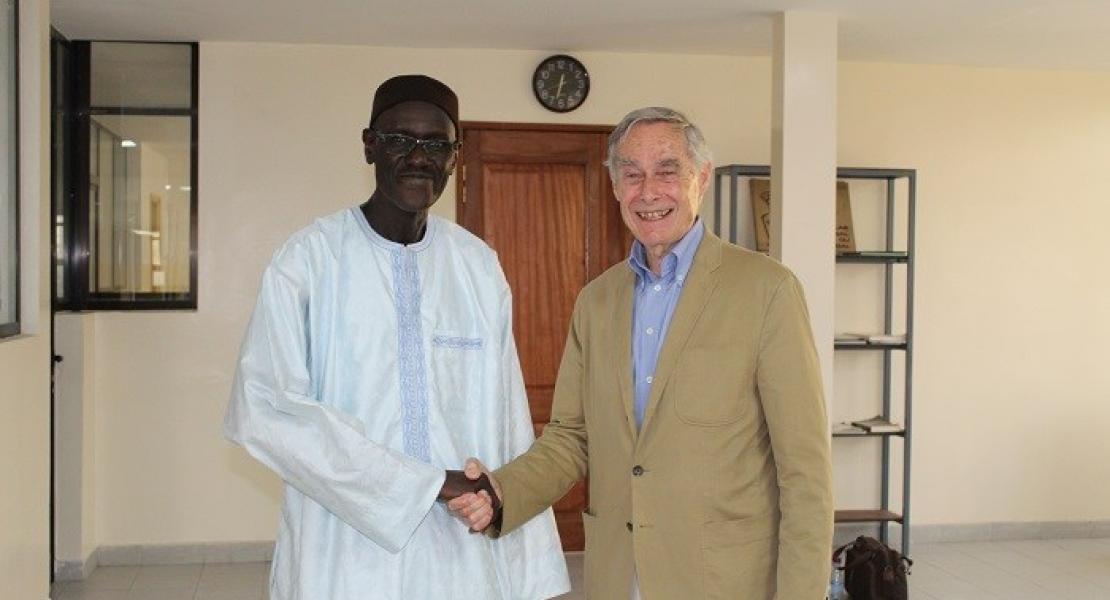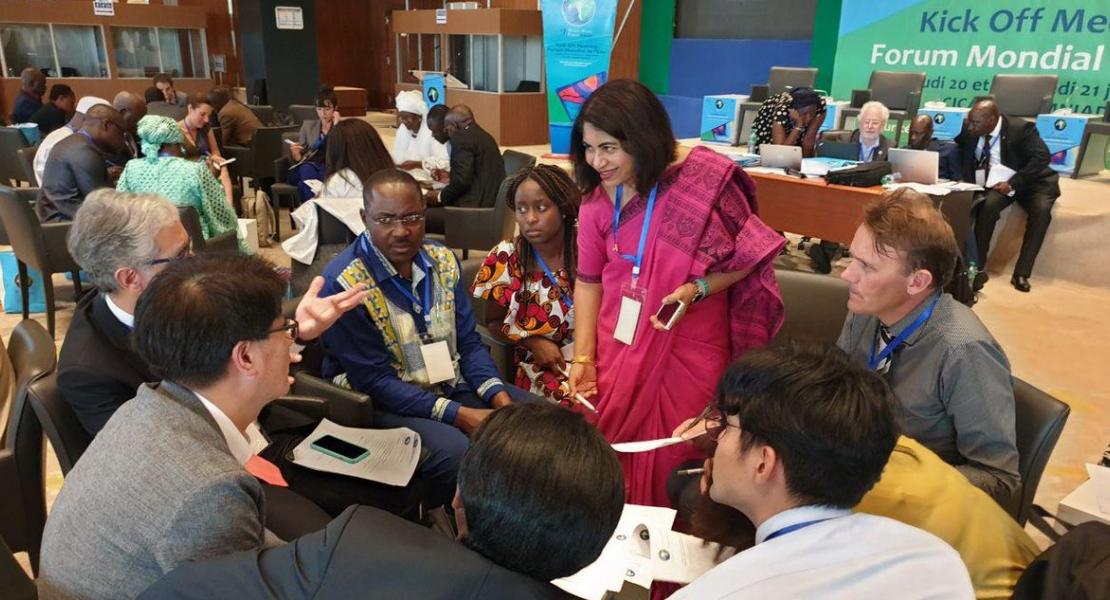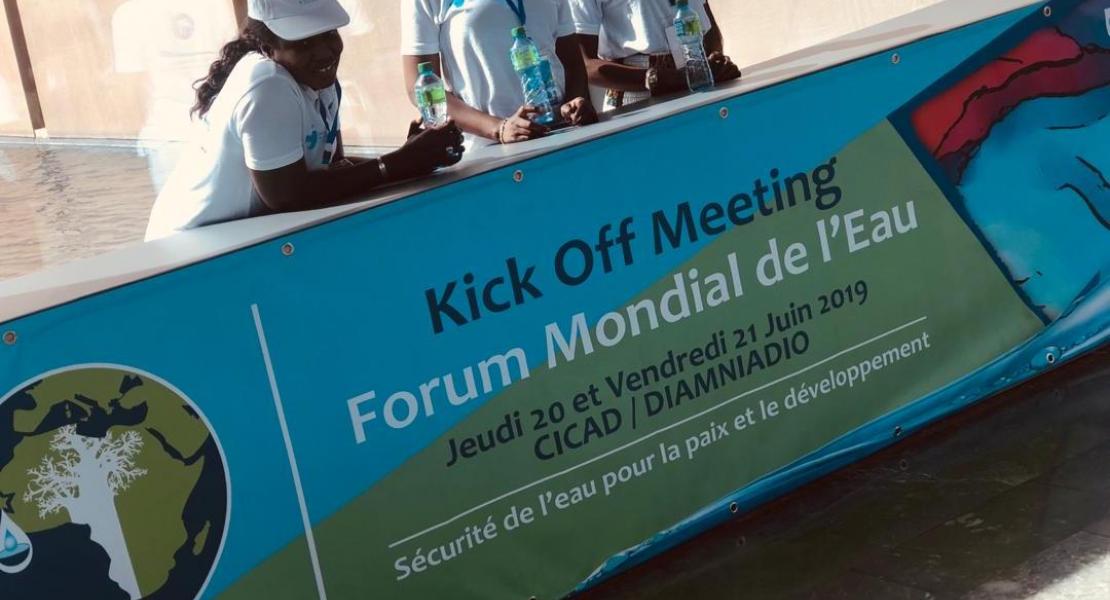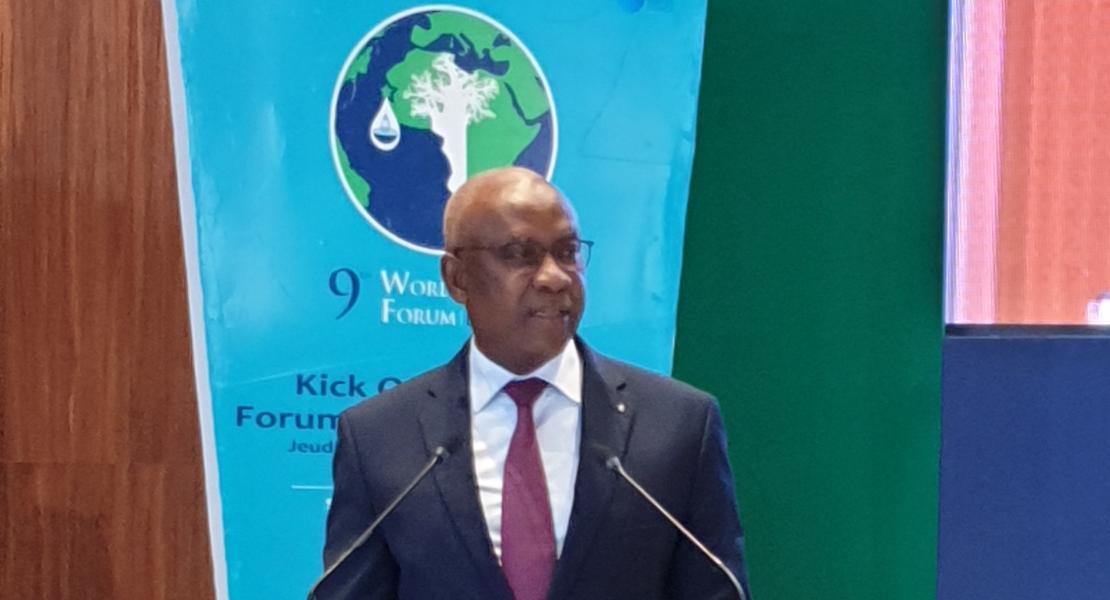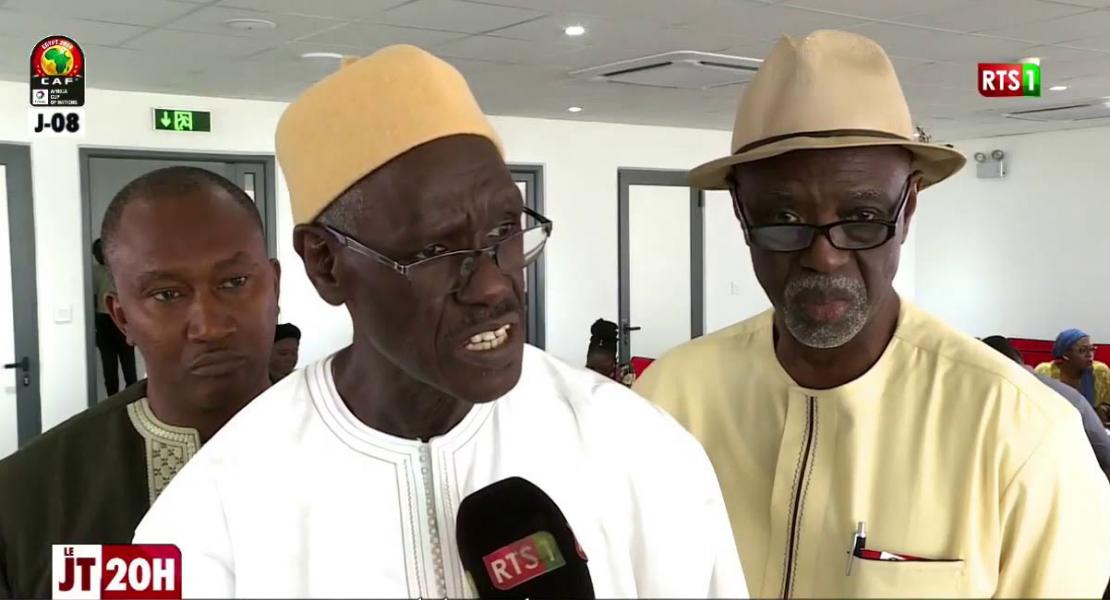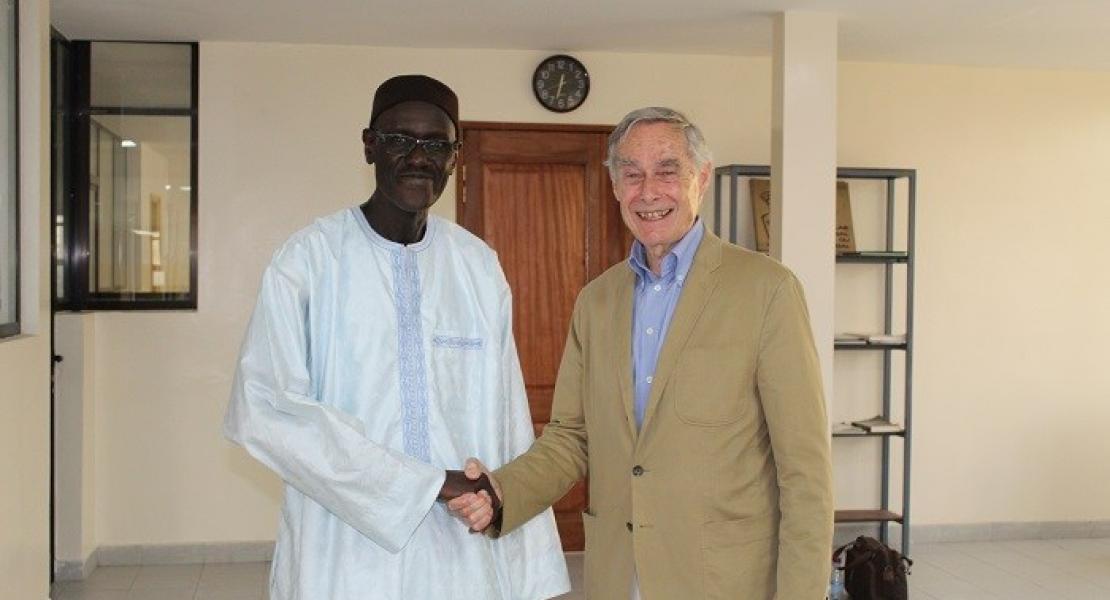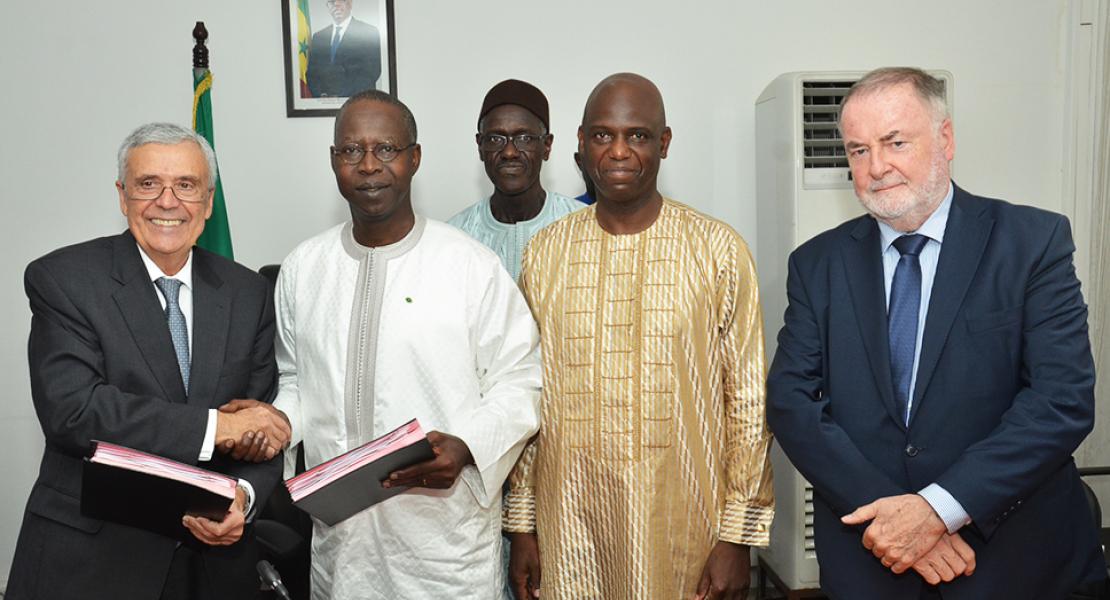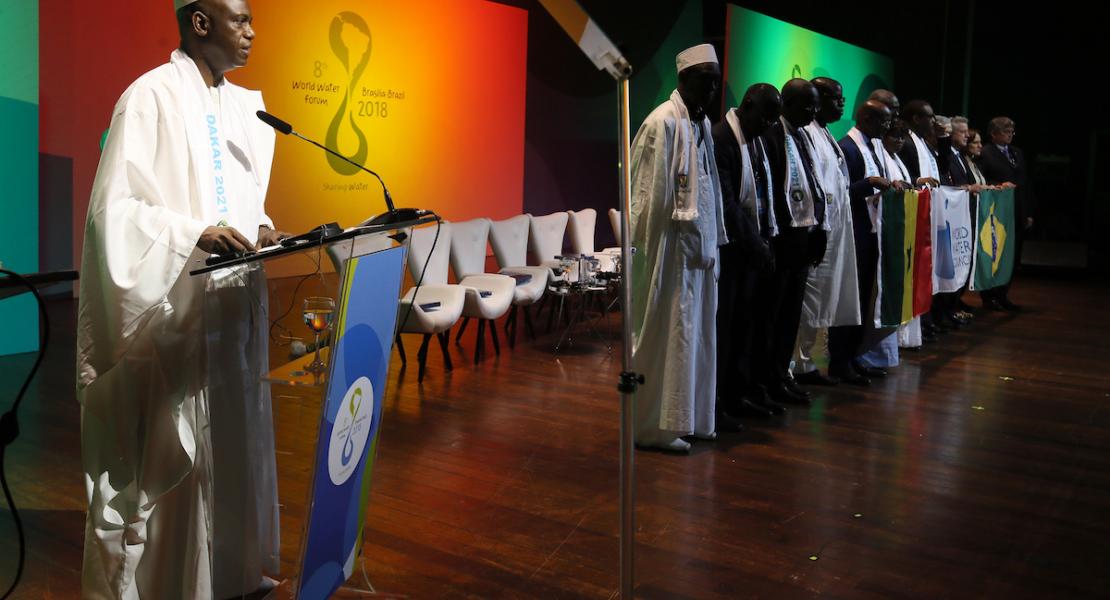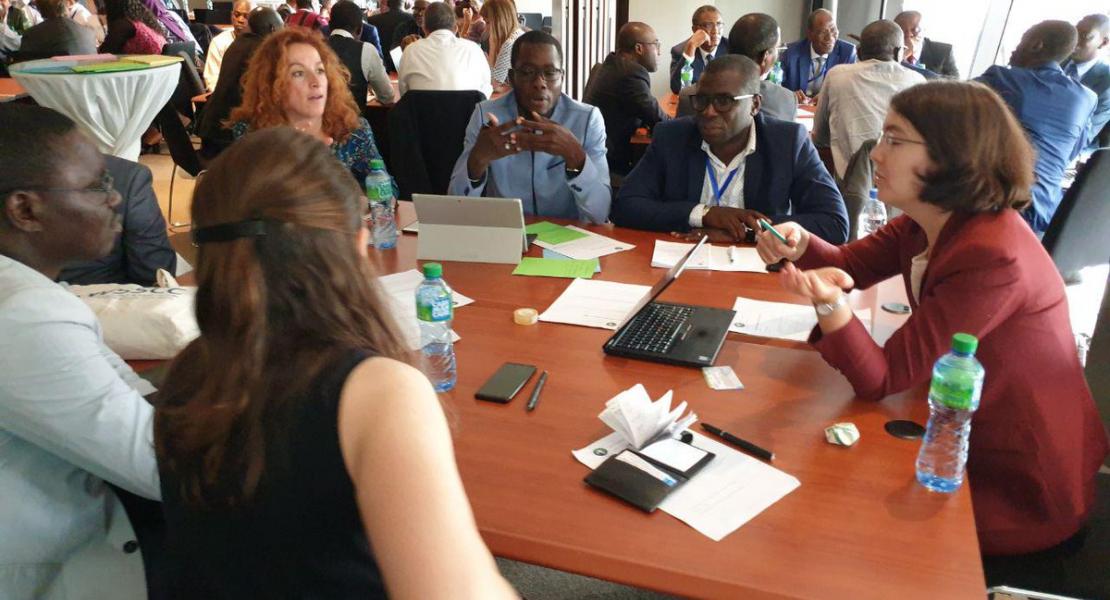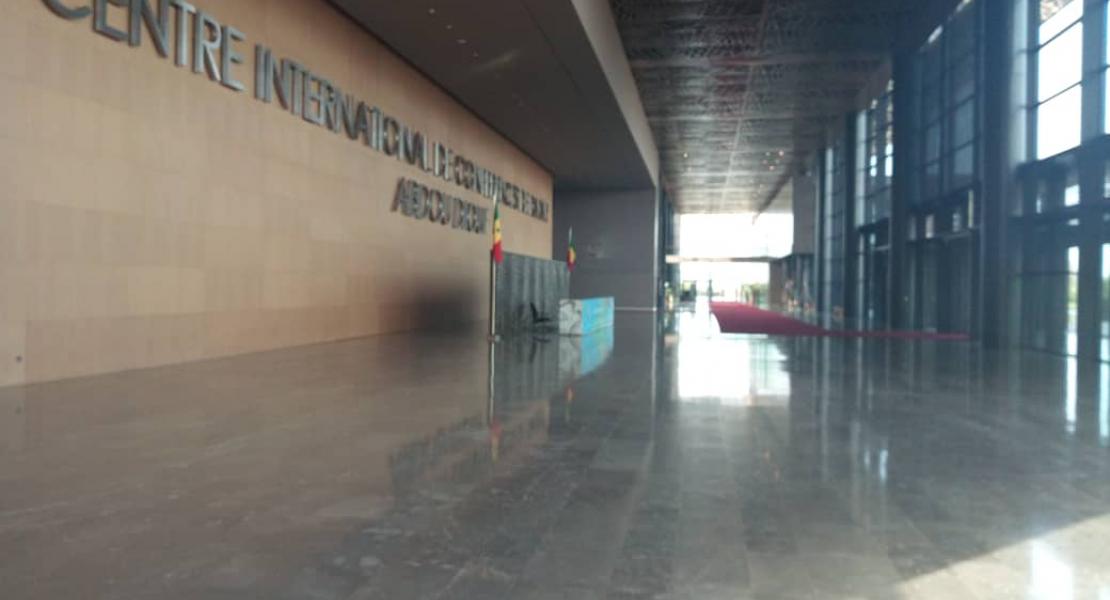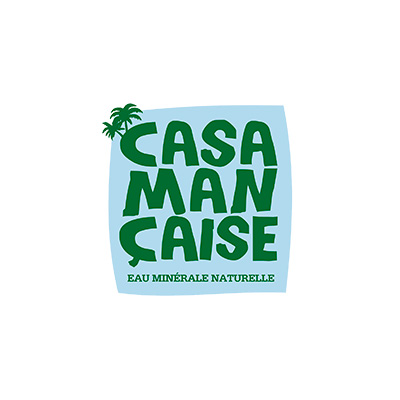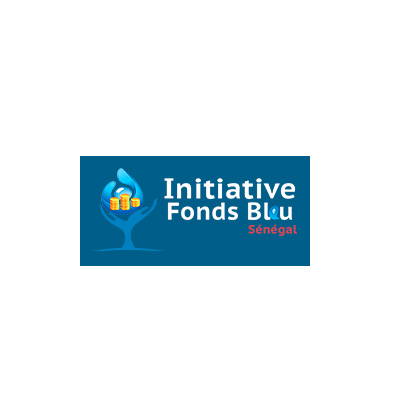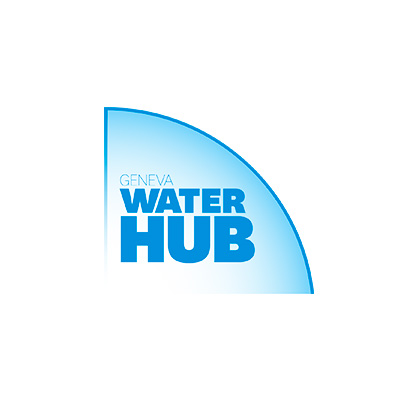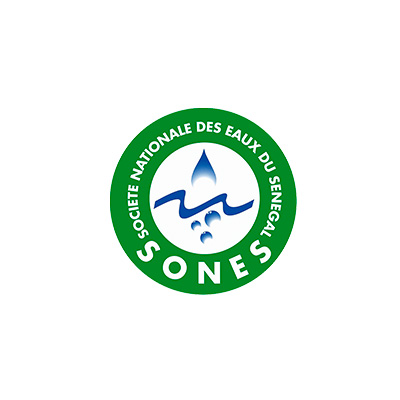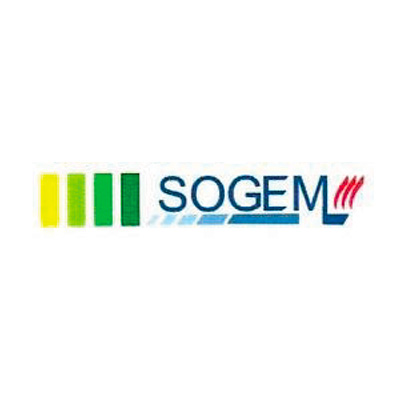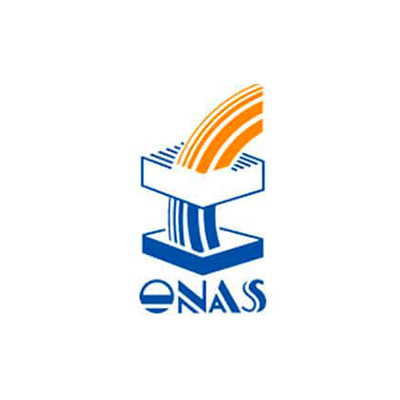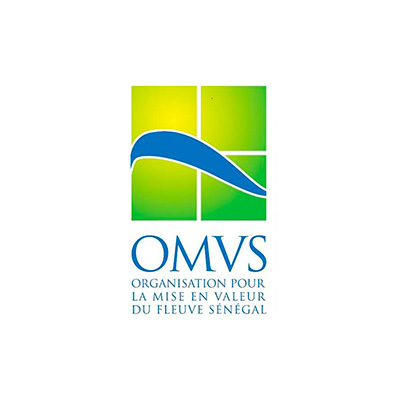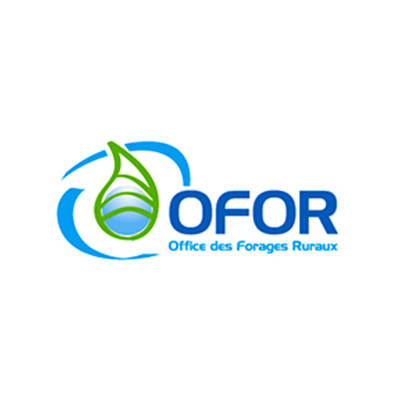The 9th World Water Forum will take place in Dakar in March 2021. It is preceded by an important preparatory meeting for the launch, the kick off meeting, on 20 and 21 June 2019 in Dakar. While the 4 main priorities and the general framework of the Dakar 2021 Forum have been set, there is still a need to break down the priorities into sessions and sub-sessions, to confirm the facilitators, partners and the involvement of all the actors concerned.
To inform you, we interviewed, in Dakar and Paris, Abdoulaye Sene and Patrick Lavarde, Co-Chairs of the Preparatory Committee for the organization of the 9th WEF. Abdoulaye Sene represents Senegal, which will host the Forum, and Patrick Lavarde represents the World Water Council, which has been at the origin of the Forum since 1997.
The stakes for the next Forum are high. In 2021, we will be at the mid-point of the Sustainable Development Goals and in particular Objective 6 dedicated to water and sanitation. This Forum will take place in Africa, where access to water and sanitation is the least developed in the world with a rapidly growing population and the harmful effects of climate change. Moreover, despite much progress and success in Africa, there is no shortage of crises on the continent, particularly in the Sahel region where water is at the heart of people’s security. This means that this Forum will have to, more than any other, take into account the humanitarian and development emergency issues for which people expect rapid concrete responses.
Abdoulaye Sene and Patrick Lavarde answer all these questions here in this cross-examination and with two short videos. On June 20 and 21, 2019, we will also be in Dakar from where we will keep you informed.
We invite you to share this cross-examination widely around you to inform your friends, relations and contacts concerned. Enjoy your reading.
Interviews of Abdoulaye Sène and Patrick Lavarde
Alain Boinet: Mr Abdoulaye Sene, we thank you for receiving us for this interview. Before addressing the issue of the World Water Forum, of which you are Co-Chair of the Preparatory Committee, we would like to ask you how the issue of water is being addressed in Senegal, the Sahel and Africa, since the Forum will be a global forum, but also more specifically a forum for Africa. How does this question arise in terms of needs and response to needs in the Sahel?
Abdoulaye Sene: First of all, I would like to thank you for your interest in the issue of water in Africa and, above all, for all the projects that Solidarités International is currently deploying throughout the world to address urgent water-related issues. I would also like to specify more specifically my opinion on the perception that we should have of water in Africa today.
Clearly, Africa remains the continent where the issue of water in all its dimensions – social, economic, political – is likely to have the greatest impact on its future. We already know that insufficient access to water and sanitation in current situations is very unfavourable and embarrassing for many of our populations. In sub-Saharan Africa, we are talking about a water access rate of around 40%. This means that even if we pushed things to the point of seeking “improved access”, up to 50 or 60%, almost half of the population would remain in a precarious situation with regard to access to water. However, without access to water, there is no guarantee for health. There may also be problems of hygiene, malnutrition and food security. It is therefore a question that already affects the lives of our populations. In addition, soaring population pressure, climate change and a host of other factors are likely to have even greater and more dramatic consequences in the future.
Alain Boinet: Patrick Lavarde, thank you also for participating in this interview. You are also Co-Chair of the Preparatory Committee of the World Water Forum, as a representative of the World Water Council. In addition to what Abdoulaye Sene has just told us, can you tell us about the theme of water, hygiene and sanitation in the MDGs, in particular goal 6, which aims to achieve access to drinking water for all by 2030. Where is the trajectory towards 2030 and in this context what is the role of the World Water Forum?
Patrick Lavarde: Thank you Alain for giving me the opportunity to express myself on Défis Humanitaires. The answer to the question of the trajectory of the 2030 agenda is in the 2019 Water, Hygiene and Sanitation Barometerproduced by Solidarités International. It shows that the gap between the objective and reality is immense. This gap is particularly true in sub-Saharan Africa, as it is a region with one of the lowest rates of access to drinking water in the world. And I’m not talking about sanitation. It is clear that this aspect of access to water and sanitation is a major challenge in the area. It is also a major challenge for general development and an essential public health issue. The figures for human losses linked to waterborne diseases, particularly cholera, show how acute this subject is.
It is also in this area of sub-Saharan Africa, an issue that exacerbates conflicts around all population movements and between different types of water users. This is the case even within rural communities between herders and farmers.
For these simple reasons, it was clear that this Forum, which will take place almost halfway through the 2030 agenda, should take place in this region and at this time. It will make it possible both to measure the gaps and to give a particular focus, on a global scale, on the challenges of this area. It will also be able to generate international involvement to address issues in this region and also to address equivalent issues in other regions of the world.
Alain Boinet : The pressure on the water has never been so high, as you just said, for many reasons. Demography is one of them, pollution and the effects of climate change are others. Basically, what changes or breaks must be made during this 9th World Water Forum in relation to the MDGs so that the objectives can be achieved by 2030?
Patrick Lavarde: Solidarités International has shown in a number of its publications and work that the Millennium Development Goals (MDGs) have made progress possible. Obviously partial progress. Today, the SDGs concern the whole world, which is a new element. They apply to both developed and developing countries, but the stakes are obviously of different magnitude. In the former, access to water and sanitation is more or less achieved. If we take the case of France, they are 99% affected. This does not mean that there are no pockets of difficulty left in metropolitan France and in some overseas territories.
The situation in developed countries has nothing to do with what can be found in developing countries, some of which are very thirsty and have immeasurable hygiene problems. In the very short term, they are confronted with very strong population growth. This is particularly the case in sub-Saharan Africa. These countries are also confronted with strong urbanization, which raises specific questions related to urban concentration. Rural areas also face different gradients of challenges depending on the continent.
I therefore believe that the interest of holding this Forum at the mid-point of the ODDs is to take stock of the situation and to be able to initiate exchanges of experience, particularly through multi-regional dialogues. This will be an innovation of the Forum since in the past there was a separate regional process for Europe, one for Africa, etc. There is no need to bring people together in Korea or Brazil to carry out these continent-specific processes. There are other platforms and opportunities for this. The interest is to be able to share success stories, obtained in Latin America, South-East Asia or in certain parts of Africa and to have exchanges of experience for relatively comparable contexts. This 2021 Forum will therefore be a forum for action and responses, following on from the Marseille Forum, which was the forum for solutions to show what was possible. Now it is time to apply these solutions.
Alain Boinet: Abdoulaye Sene, you also said that this water situation is likely to get worse. We can therefore think of climate change and its consequences, but also of demography, as Patrick Lavarde has just mentioned. According to the figures, the population of the Sahel will double in twenty years’ time. It would increase from 84 million inhabitants in 2015 to 240 million in 2050 and more than 500 million in 2100. This means that more people need to be supplied with water, hygiene and sanitation. This is a huge challenge, since it also concerns water for agriculture and water for international cooperation. How do you address these issues in Senegal? Can you imagine any changes in regional development policy?
Abdoulaye Sene: When we analyse water issues from the perspective I have developed, that is, it is already a very complex problem, particularly for Africa, it is clear that there are indeed extreme emergencies. Even if the situation is not generally good, there are situations where we can go so far as to say that they are very bad and very difficult to deal with.
On the other hand, the action that has been taken by the public authorities for some time has not always been in a very fair way. When you look at the disparities between regions, between the urban and rural worlds, it is clear that a certain segment of the population lives in even more difficult conditions for multiple reasons – geographical, human, etc. – and that is why it is important to be aware of the disparities between the regions. Addressing this issue therefore requires a finely tuned approach and a clear understanding of the problem in its various dimensions – territorial, social and economic. We must look at the emergencies and provide solutions for the populations as well as address the disparities between the rural and urban worlds. And finally, specific policies must be implemented to accelerate access to water in rural areas. For urban space too, it must be considered that there are also several strata: the peri-urban, suburban and urban centres, which are generally more modern. All this must be taken into account.
Senegal was very early on sensitive to this requirement, namely to treat all components in a balanced manner. Most recently, we launched a special program: “the Emergency and Community Development Program”. Its main purpose is to correct the imbalances between rural and urban areas. We therefore want to invest massively in rural water and sanitation to ensure that this part of the country, which is very important and home to a large majority of the population, sees its living conditions improved.
At the same time, it remains necessary to push investments to a level that allows a certain quality of service and in order to meet standards. We know that in some parts of the country, having ten litres of water per inhabitant is difficult, whereas the minimum should be 35 litres. However, in other areas where standards are set at 60 litres, we are not sure that we can properly meet the demand. Senegal has therefore also worked to develop a water policy with some very strong ambitions for Dakar, its capital, and the major sites.
This is why Senegal has been developing large water supply projects with water transfers and making large inductions from boreholes for years. More and more, we are moving towards securing the water supply service with the use of less conventional sources. Senegal, for example, has committed itself for the next three years to build one or two desalination units. The Senegalese government has really taken the water issue to heart and provided a global response, with local variations that make it possible to develop inclusiveness, address specificities and also work to strengthen resilience.
We all know that Dakar experienced a dramatic situation last year, but also two years ago. Most of the 40% of the water supply came from Lake Guiers and when there were problems with the lake station it caused an extremely serious situation. The authorities then further accelerated measures to improve resilience and reduce vulnerability. Senegal’s water policy is therefore a comprehensive, well-informed policy that takes into account the protection of resources, balance, equity and the anticipation of population growth.
Alain Boinet: I even imagine that this Senegalese policy could serve as a reference in other countries in the region for which the response is less developed or which are experiencing crises, including security crises. We are talking about the Sahel, which is facing security crises. How, still in the context of the policies pursued, but also of the Forum, do you see the link between responding to crisis situations and regional insecurity? How to deal with the insecurity that makes it difficult to respond? Is it with actors like the G5 Sahel and the Alliance Sahel who are now global actors? With which ones should we cooperate since they have very different mandates and resources? In this regard, much is said about this famous “security and development” nexus and all actors are confronted with it. How do you see this problem?
Abdoulaye Sene: Senegal can perfectly claim to be a model of success in the water sector. This is due to several things. It should be borne in mind that Senegal has had particular attention to water issues for a very long time. The first large deep wells in West Africa were drilled in Senegal. It is linked to history because Senegal was the capital of the French West Africa. At the time, all water projects were developed first in Senegal and then disseminated to other countries. In Senegal, there were therefore the first large boreholes, the first major management and maintenance strategies, the first pastoral boreholes and what we called “multi-village boreholes”. Very early on, the country also succeeded in coupling motorized and manual drilling. Certainly it is a country that has developed over the last few decades, a very strong expertise and experience, whether in the field of village pastoral, as I have just mentioned, or in that of urban water supply.
I think that Senegal, beyond these purely technical issues, at the institutional level as well, has been a pioneer in many reforms, both in its legislative framework and in the production of its water code in 1981. Our ambition is therefore to continue to anticipate and adapt responses to the Sahelian context.
The Sahel is indeed a reality that has its own specificities. You are right to talk about the G5-Sahel. We believe that what has been done in Senegal in the field of water, both rural and urban, is very useful for the construction of projects within the framework of the G5.
As for the nexus, I would rather speak of a “water-security-peace” nexus. It is essential when you analyze the context of the Sahel. Some leading experts will tell you, for example, that the current drying up of Lake Chad has been a major factor in the generation of conflicts, or at least a aggravating factor. When there is no water and livestock farmers, who are used to certain transhumance routes, are forced to leave these routes, encroach on farming areas and are confronted with difficult situations with sedentary people, this leads to conflicts. When you look at what is happening by doing very fine geostrategy, you realize and everyone in West Africa knows that cohabitation between livestock farmers and farmers was once easy. However, it has become very difficult every time there has been a shortage of water resources. So it is extremely interesting to work on the issue of water in the Sahel.
At the time of these first tensions, Senegal had developed a very interesting strategy for the pastoral zone. We said we were going to compartmentalize the region. Drilling would be meshed every twenty kilometres to facilitate travel and also to avoid overexploitation of the land. It was necessary to distribute the burden and ensure that there were enough reserves in the area so that farmers did not have to encroach on agricultural land.
It is therefore certain that the Senegalese model could contribute something to the formulation of water projects in the Sahel. And Senegal remains very open to this. It is a country that has clearly understood the importance of developing cooperation around water. It is no coincidence that Senegal now has the headquarters of the two major West African transboundary basin organizations, which are among the most efficient in the world. These are the Organisation for the Development of the Senegal River (OMVS) and the Organisation for the Development of the Gambia River (OMVG), all of which are based here in Dakar.
Senegal has always believed that instead of fighting for the ownership of a river or a city, it was better to associate with neighbours and develop strategies of solidarity. What matters is the well-being of the populations, which are closely linked from one city to another. They are often the same families. The border then remains very artificial. It should not be a source of breakdowns. On the contrary, it is only a purely administrative line. We have border areas and we should work to develop solidarity areas. So yes, the nexus of development, water and peace is essential.
Nor is it by chance that Senegal was the first country in the world to have the inspiration, or perhaps even the audacity, to bring the water debate to the Security Council: “water-peace-security”. We believe in this and it is in Senegal’s own DNA to say that we must cooperate and dialogue around shared resources. We must show solidarity. That’s why I like the name of your association.
Senegal remains an exemplary country in this field and intends to strengthen its capacities and leadership in the water sector… It is also for these reasons that Senegal has offered to host the World Water Forum. We want to highlight Senegalese experience and expertise on these subjects. We also want to show that we support dialogue so that the world as a whole can work to find more appropriate responses.
Alain Boinet: Patrick Lavarde, this World Water Forum will take place in Dakar in March 2021, in Africa, a continent on which some countries have a good level of development and growth. But other countries are in crisis situations. I am thinking in particular of Mali, Burkina Faso, Niger, Chad, the Central African Republic, the Democratic Republic of the Congo, and the Horn of Africa. Basically, this may mean more for this Forum in taking into account emergency situations – humanitarian aid and also development situations. Will there be a specific approach for these African countries, which are facing crisis situations?
Patrick Lavarde: Indeed, this is a very important point. There are two situations, which are not opposed, but which must be distinguished. On the one hand, there are the structural situations. Where we all know that water, which is more of a connector than a sector, is a major development issue as a whole in terms of food, health, education and so on. And then there are in some places, emergency situations with very short-term challenges. These two aspects are not mutually exclusive, but are not treated in the same way. In a way, this Forum will highlight these aspects. They are not the same tools, they are often not the same actors.
From this point of view, Senegal is particularly well chosen since it is somewhat at the junction of areas in difficulty. It is therefore particularly concerned with water security issues, linked to security in general. In addition, Senegal has an equally important experience to share because it is a country that has long invested in water, sanitation and access to water in rural areas, which may also have led to lower population growth and urbanization in that country than in other countries. Because if we keep people in rural areas, we avoid concentration in megacities.
Senegal also has remarkable experience, as Mr Abdoulaye Sene has just pointed out, with the two river basin organizations Gambia and Senegal. A functioning basin organization is a rare case in Africa and provides guarantees in these areas.
On a more global scale, Senegal has played a leading role. This was the case in the United Nations in particular, when he was President of the Security Council. The President of the Republic of Senegal was one of the members of the panel of heads of state on water. Senegal embodies on the international scene the challenges of water in developing countries, particularly in Africa.
Alain Boinet: Since we are talking about the World Water Forum, what are the characteristics that distinguish this Forum from previous ones?
Abdoulaye Sene: First of all, it is a forum that will take place in Africa. This already makes a big difference in that the question arises in terms of urgency. The Forum is being held in Africa where we cannot claim to have the same financial resources as France, Korea or Turkey. For this Forum, we must therefore be inventive and innovative, aiming at social, economic and political efficiency. To do this, we have tried to get our partners, especially the World Water Council, to join us in the idea that the Forum should be very connected to the global agenda. We want it to position itself on the global agenda, not just for today, but for history. We intend to remain very close to the climate agenda, the Sustainable Development Goals (SDGs), and all other agendas such as food security. We have them in mind and want them to be able to stimulate reflection.
But while remaining global, this Forum must also be a local forum that addresses the populations of a continent with pressing needs. We must therefore develop dynamics that make it possible, already in the preparatory phase, to ensure that there are actions and projects with local responses for the populations.
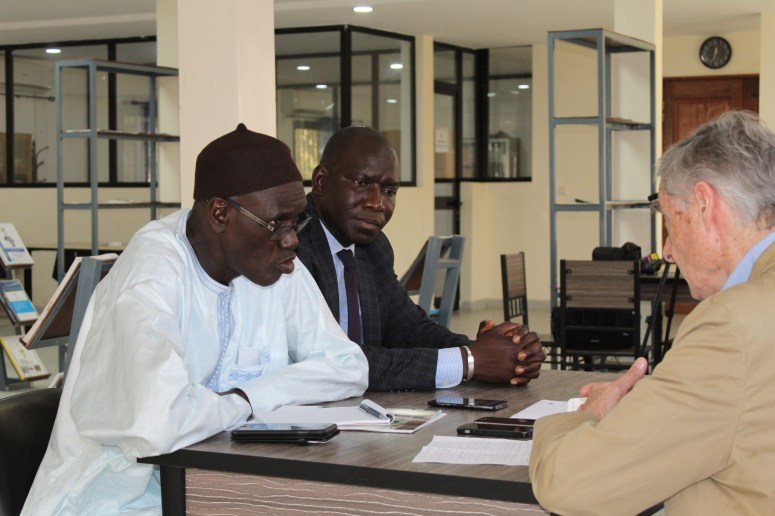
This is why one of the major innovations of the Forum will be the Dakar 21 initiative. This initiative will essentially consist of a set of projects compatible with the objectives of the Forum. These will also be projects that can be carried out in the short term. They will then have the opportunity to register on a larger scale with the 2021 Forum. The approved project leaders must be able to come in March 2021 to present concrete results and demonstrate their impacts. Then, they would bring proposals allowing them to move to another scale, at the African level but also on the scale of other continents. This is a very important initiative. We are currently working on it with the World Water Council, but also with many other actors who wish to contribute: the OCCE, France, Korea, Germany. Many countries have already noticed the interest of this initiative.
The other innovative initiative of the 2021 Forum, focusing mainly on water, peace and development, is that we will try to make it more “focus” and therefore more effective. Until then, the forums were very open with sometimes 500 sessions. There were then difficulties in identifying where the priorities and expected results were. Our idea is to say that from the main theme, we will choose four priorities and focus on these four priorities so that from 500 sessions we can perhaps move from 150 or 200. these sessions should be structured, well prepared and can thus lead to very concrete initiatives and proposals. The World Water Council, after listening to us, has reassured us on the relevance of this option and supports us. The four themes are:
- Water security
- Cooperation, in its broadest sense
- Water for a calmer world
- Tools and means
The third innovation is to mobilize all stakeholders. We thought that instead of having an institutional preparatory process where there was a “silo” preparation and everything was done in parallel, we should open up. In the last forums, there was always a political process where ministers met among themselves, local elected officials dialogued among themselves, parliamentarians also stayed among themselves… There were thematic processes where men of knowledge, university, met and once again discussed isolation. The same was true for professionals, each finally in their own speciality. Even at the regional level, the actors were in dialogue with each other while the same problems were discussed everywhere, without exchanging with the outside world. We said to ourselves: “Let’s try for once to put all these actors together on the same theme”. The Dakar Forum will have an open process. It will be decompartmentalized and inclusive. On a theme, we will find politicians, academics, professionals, the private sector and citizens. Together, they will discuss the same themes and try to build ideas and proposals. This is a strong innovation.
In addition, we consulted extensively with individuals and undertook evaluations of previous forums. We have deduced a number of improvements from this to refresh the Forum and really bring it into line with modernity. We decided that the Forum should be connected to international events. Since 1997, the first edition, the panorama of international events has changed considerably. Today, you have a flowering of this type of international events, which is a good thing. This may even be the result of the action position of the World Water Council and the water forums. Today, you have, for example, Water Week in Stockholm or Water Week in Singapore. There is a multiplication of international events that discuss more or less the same thing. We then asked ourselves the following question. How can we ensure that the Forum is anchored in this existing system? Do not do the same as them and make them contribution platforms for the Forum in terms of output and inputs. The Forum will therefore build on these platforms and allow the meeting of stakeholders. This will make it more efficient and economical.
I could have mentioned other innovations, but I will focus on the latter. It is a question of developing strategic partnerships. Until then, the large countries and the World Water Council were in an organizational logic with committees essentially led by these two entities. For the most part, we keep this organization. But we will try to have a construction in concentric circles. Each working group will have a core consisting of the World Water Council and Senegal. And there will be a second circle with strategic partners, which may be international institutions, NGOs or university research centres. The objective will be to support the co-organisers in the preparation. Finally, a third concentric circle will be made up of the remaining actors. This approach is extremely important to us. This will really add value to the preparatory process. Indeed, if we take water for rural development as an example, we must include as a partner a UN organization to talk about the development of programmes, policies and initiatives. They will therefore accompany us – without imposing their agenda – so that we can benefit from their expertise. Similarly, in Africa, there is one country ahead in terms of water over rural development, namely Morocco. There have been extraordinary things done in this area in Morocco. We must bring this country, its perspective and its national expertise to the Forum. There are also NGOs, such as Solidarités, that support us in the water sector. So we want to have its strategic partnerships. It is a new dynamic that we have introduced to improve the Forum’s porting and inclusiveness. With these few innovations, you therefore have an idea of what the Dakar Forum wants to bring.
Alain Boinet : The World Water Forum is usually organized by the World Water Council, whose President is Loïc Fauchon, and the host country. Patrick Lavarde, could you introduce us to this Council a little bit? Independently of these two co-organisers, there is in France the French Water Partnership (PWE) which brings together many of the actors in this field, you are even a member. What are your expectations of the PWE for the Forum?
Patrick Lavarde: The World Water Forum, which was born in 1997 in Marrakech, is the world’s largest event for the water community. It is very original because it is the only event that brings together heads of state and government, NGOs in the field, large multinational water companies and SMEs, local authorities and parliamentarians, international organizations, scientists and independent consultants… Finally, it is a composition comparable to that of the PWE whose colleges correspond to those of the World Water Council.
In past editions, the Forums have been held in developed countries. They have made it possible to advance important water issues. For example, the recognition of access to water in 2010 benefited from the awareness of the first Forums. Another example is the ratification of the convention on transboundary basins, which was an issue of the Marseille Forum (2012). As a result of the Forum, more than 35 countries have ratified this convention, allowing it to enter into force. Governance was also an issue at the 2012 Forum and now, thanks to the OECD, which leads the Water Governance Initiative, guidelines have been produced and are being implemented. The Forum is therefore first and foremost a brainstorming forum that makes it possible to give visibility to certain issues.
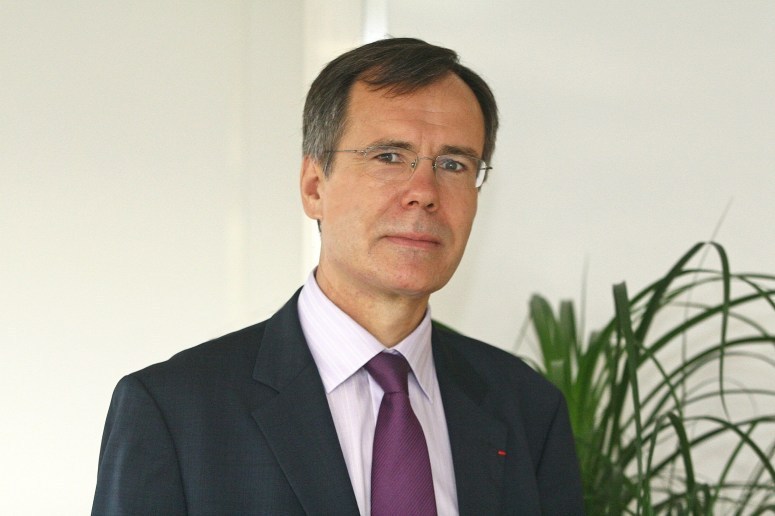
As I mentioned earlier, the 9th Forum will focus on a number of new approaches. The elimination of regional processes should make it possible to create a stronger dialogue between the regions of the world. We will also try to stop working in silos, as Abdoulaye Sene mentioned. In the past, the political process was relatively disconnected from the thematic process. Within the political process itself, ministers remained among themselves, parliamentarians and local authorities as well, with little interaction. The thematic process was the business of professionals, engineers, technicians from the water world. It has been supplemented, as the case may be, by a science and technology process as was the case in Korea or by a citizen process in Marseille. But everyone was in their own silo. For 2021, we want to focus the Forum on a limited number of priorities: water security (1), water and rural development (2), cooperation in its various forms (3), and financing, governance, innovation and knowledge sharing (4). On each of these priorities, the objective is to work jointly with political and technical authorities and citizen structures. This is a challenge for the Preparatory Committee because Heads of State and Ministers are not used to this kind of exercise. We will see if it works. If this is the case, then it will be an important innovation.
Another innovation will be to bring out projects and give visibility to these projects. This is what our Senegalese friends call the “Dakar 2021 initiative”, where project leaders would come to have them recognized and receive a label. Funders of all kinds could then take an interest in these projects when they are emerging. A kind of “speed dating” could be organised around these projects.
If I draw a parallel with what happened at COP 21 in Paris, the French government granted one million euros, a modest amount on the scale of the stakes but still not negligible, to a project incubator. There were then seven or eight projects that were matured by the Global Climate Alliance – born of cooperation between cities, companies and basins and led by the International Office for Water. It is a bit the same idea for the World Water Forum. If we can make this exercise sustainable and prosper over the long term by targeting donors, it would be a success.
As such, the PWE and the community it brings together are potential actors in this process. The President of the PWE, Jean Launay, is working on developing a partnership between the Forum and France in this direction.
Alain Boinet: Abdoulaye Sene, you mentioned a call for expressions of interest in terms of strategic partners. When do you plan to launch this appeal? In addition, on 20 and 21 June there will be a preparatory meeting for the Forum, the Kick-off meeting, what do you expect from it? What are the objectives you have set for yourself?
Abdoulaye Sene: To be more specific about expressions of interest, I would say that we identified the partners very early on. We understood very early on that the success of such a Forum depended on great anticipation. So we tested this idea of strategic partners beforehand and in this phase we immediately had expressions of interest. Very early on, we worked to try to refine this initiative with these partners. They represent the first fringe of these partnerships, but we have the idea of expanding them.
Let us take the natural case of France, I think that on a global scale France is recognized for its leadership in the water sector for several reasons. The major companies in the water sector are mainly in France, for example. We also know that in terms of research, the French industry is very advanced. We know that in the field of governance, the World Water Forum in Marseille was a precursor. Quite naturally, we therefore asked France to be a strategic partner, particularly with regard to governance. The process has therefore already begun and we intend, between now and the Kick-off meeting, to complete the consultation work and perhaps make a final loop to see who really wants to engage as a strategic partner in this Forum.
As far as the Kick-off meeting is concerned, for us it is a very important event in the preparatory process. It is through this Kick-off that we will develop what should prefigure in terms of the format of the Forum. We will try to define the four priorities I mentioned earlier, to refine their content and to have the framework for what these sessions will be like.
Then, the Kick-off meeting should allow us to define a roadmap for the preparation. Once we have organised very open sessions, during which we will listen to all the stakeholders, and the framework of the sessions has been defined, we would like us to ask ourselves how the roadmap for March 2021 will be organised. When will the first working group meetings be held? How are we going to organize them? Are we only going to hold physical meetings or are we going to use other mechanisms that will allow us to use virtual consultations or tabled consultations? All this will have to be discussed and defined at the Kick-off meeting.
We see this process in two main stages. The first will be around a session of a highly political nature in which the Senegalese authorities, the World Water Council and perhaps other stakeholders will deliver messages to remobilize the international community and indicate some strategic priorities.
Then there will be the technical sessions during which we will carry out the work I mentioned: clarify the themes, define the framework and format of the sessions, and even the initiatives on which work should already begin. I think that the Forum must indeed take a position on very concrete things. In Africa, for example, everyone is currently talking about climate change, ecosystem costs and the degradation of large mountain ranges such as the Fouta Djallon, which gives rise to the main rivers in West Africa. These are worrying degradations. Similarly, when we look at the Lake Chad issue, we have talked about it a lot, it is first and foremost a question of water issues. In the process, can we not offer this issue an opportunity to develop initiatives? And beyond that, there are other parts of the world that have other equally important, sensitive and urgent issues that could therefore be addressed. We want to bring out these issues.
Patrick Lavarde: Yes, the kick-off will be opened by the President of the Republic of Senegal, which attests to the ambition to have a strong political mobilization on water issues. The kick-off meeting is always an important step in the forums since it is the event that mobilizes the actors to define the roadmap, as Abdoulaye Sene has just said. Indeed, what is important in the Forum is not only the week of the forum, but also the preparatory process. It is worth as much as the final result.
Since we said that the idea was to make a different Forum, we must give substance to this idea. The Forum will not necessarily result in a ministerial declaration, prepared by diplomats who are often unfamiliar with water-related issues. The objective is to be able to identify results on each of the four priorities that can create significant progress. This is an essential objective. Indeed, bringing people together to find out if there should be ten or twenty sessions on this or that sub-topic is easy. On the other hand, being able to identify responses with the richness of a multi-stakeholder and multi-regional exchange is an important challenge. The result of the Kick-off meeting is to be able to identify “war takes”, i.e. the few results expected at the end of the Forum. This will allow the preparation of the Forum to focus on these objectives.
Alain Boinet: There have been exchanges of letters between the French and Senegalese Presidents. This is a possible dimension of strategic partnership. Other strategic partners will also be present. Who will these partners be, what is the strategic partner’s stake for the Forum? What can we expect from France on the one hand and from the other partners on the other? What does the two-day international conference at UNESCO on 13 and 14 May bring to this perspective?
Patrick Lavarde: The idea of strategic partners is a way of institutionally involving major international water sector actors in the dynamics of the Forum. In the past, this was done in a more informal way. For the 9th edition, our Senegalese colleagues wish to formalize the most significant contributions to the Forum. For each of the priorities, there will be a core of preparation that will involve experts (people with very good knowledge of a priority) on the one hand, and major actors who have something to say about the priority in question or who can provide resources of different kinds on the other. It will therefore be the interaction between these two subsets that will constitute the skeleton of the preparatory process. The idea being of course that strategic partners do not only come to “sell” their agenda or what they have already prepared, but to stimulate them by going further with the experts.
For example, on the margins of the UNESCO conference in mid-May, an agreement was signed between the Korean and Senegalese governments. There was another one between UNESCO and Senegal, and one between UNESCO and the World Water Council. Recently an agreement between the Government of Egypt and Senegal was also concluded during a state visit. These partnerships show the particular interest of many stakeholders in water issues in Africa and particularly in Sub-Saharan Africa. Thus, the Kick-off meeting will be an opportunity to encourage other actors to participate and get involved. All countries and institutions that so wish are welcome.
Alain Boinet: Abdoulaye Sene, following this exchange of letters between the President of Senegal, Macky Sall and the French President, Emmanuel Macron, what do you expect from France? One of the main strategic partners on the four priorities?
Abdoulaye Sene: To be clearer, I will first mention the special relations between Senegal and France. I think that we must first take this into account to understand the nature of this partnership. First, we think we all belong to the Office international de la francophonie (OIF). Senegal has hosted two Francophone summits and is one of the most committed countries to the Francophonie. We therefore believe that we have this in common and that the French-speaking world, not just France, must really mobilize to hold this Forum. This is a challenge for Senegal and the Francophone community.
Secondly, Senegal and France have special economic, diplomatic, political and social ties and agreements. The nature of these links should lead to France being at the side of Senegal in the organization of this Forum. It should be added that France today has imposed a leadership recognized worldwide in the field of climate and which says climate, known as “water”. Jean Launay often repeats to him that “the climate is water”. So with all the commitments that have been made, at the World Planet Summit or the Paris Agreement, France cannot fail to seize the opportunity offered by the World Water Forum in Africa to demonstrate its commitment and leadership in the water sector. I also think that France has a diversified expertise. I am referring in particular to the private sector and research. The French experience is an experience that inspires a lot today. And I could mention many other things that France is doing in the field of water, things that we would also like to promote within the framework of the Water Forum.
As I mentioned, France successfully held the World Forum in Marseille with actors and tools. We therefore want France to be at our side from the very beginning of the process. We need its expertise as a country that has hosted a forum and has been successful. Beyond that, France has inspired many things about governance that we are replicating. It can thus help us to support reflection on financing tools in terms of management. But France, like all countries, also faces problems in the water sector, problems of cooperation. Thus, for this Forum to be successful and successful, we believe that France, Senegal’s partner, must be involved. Africa’s success will be that of France, because it will also be that of the French-speaking world.
President Macky Sall sent a letter to the French President to discuss the Forum. This shows that the expectation is high. And the discussions had already started on 7 March 2018, even before we went to Brasilia. From the outset, the President told us that this was a challenge and that Senegal could not afford to do any worse than the others. The Dakar edition must be as successful as the other editions. We must have the same standards on the organization. That is why we want to establish this partnership with France.
President Macron’s positive response also delighted and reassured us about the possibilities of this partnership. But you’re right, maybe we should go a little faster. I usually tell our French friends that they have to adapt to the new realities of the world and walk faster. President Emmanuel Macron is a man of the “march” and that’s exactly what you have to do: walk faster. On May 14, we will sign a UNESCO protocol with Korea, Morocco, Egypt, etc. France was approached very early, all the others were approached long after. I understand that by wanting to do well and do it with a lot of scope, France wants to take its time to prepare well. But I think we have to move quickly. That’s the only thing we’re questioning today: the pace. President Macky Sall, who talks a lot about acceleration, would like President Emmanuel Macron to reassure the world by going faster. Senegal is certainly very modest in its capacities but has no lack of ambition and can rely on a network of partners and friends who will be present at our side to address the difficulties.
Alain Boinet: Patrick Lavarde, what can we expect from France in particular for this Forum as a strategic partner and do you have anything to add to conclude this interview?
Patrick Lavarde: I cannot speak on this point on behalf of France, knowing that I am involved in the Preparatory Committee as Honorary Governor of the World Water Council and former President of the International Water Resources Association, a founding organization of the World Water Council. Nevertheless, I am aware that the President of the French Republic has expressed France’s interest in participating in the preparation of the Forum.
France has a long history with Senegal and we are jointly mobilized in the French-speaking world. After forums held in non-French-speaking countries, the 9th forum is an opportunity to promote the Francophonie. It is also an opportunity to share our know-how in water management and to show, for example, what French humanitarian NGOs that are particularly active in Africa are doing. The World Water Forum in Africa is a challenge for our country and for the European Union if we refer to the action that other countries can develop on the African continent, an emerging continent with great potential. There is clearly an obligation to be present at the geostrategic and humanitarian level.
Source : Défis Humanitaires

